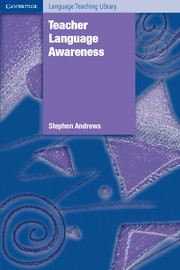Book contents
- Frontmatter
- Contents
- Acknowledgements
- Introduction
- Prologue: The challenge of being ‘language-aware’
- 1 Language Awareness, ‘Knowledge About Language’ and TLA
- 2 TLA and the teaching of language
- 3 TLA and the ‘grammar debate’
- 4 TLA and teachers' subject-matter cognitions
- 5 TLA and pedagogical practice
- 6 The TLA of expert and novice teachers
- 7 TLA and the native-speaker and non-native-speaker debate
- 8 TLA and student learning
- 9 TLA and teacher learning
- Epilogue: TLA and teacher professionalism
- Appendix
- References
- Index
- Publisher's acknowledgements
2 - TLA and the teaching of language
Published online by Cambridge University Press: 30 July 2009
- Frontmatter
- Contents
- Acknowledgements
- Introduction
- Prologue: The challenge of being ‘language-aware’
- 1 Language Awareness, ‘Knowledge About Language’ and TLA
- 2 TLA and the teaching of language
- 3 TLA and the ‘grammar debate’
- 4 TLA and teachers' subject-matter cognitions
- 5 TLA and pedagogical practice
- 6 The TLA of expert and novice teachers
- 7 TLA and the native-speaker and non-native-speaker debate
- 8 TLA and student learning
- 9 TLA and teacher learning
- Epilogue: TLA and teacher professionalism
- Appendix
- References
- Index
- Publisher's acknowledgements
Summary
Introduction
The previous chapter provided a brief overview of the history of interest in Teacher Language Awareness (TLA), in the context of the renewed attention given since the late 1970s to issues relating to ‘Language Awareness’ / ‘Knowledge About Language’, and in particular to the role of explicit language knowledge in language learning. The aim of the present chapter is to examine the language awareness of the teacher more closely, and to consider the nature of the role it plays in the context of language teaching and learning. The focus of the chapter is on L2 teaching and learning, with particular reference to TLA as it relates to grammar. However, many of the issues raised may be equally relevant to L1 teaching, and, as I have already noted, the TLA construct is seen as applying in principle to the full range of a teacher's language knowledge and awareness, not just to grammar.
The chapter begins by asking What is Teacher Language Awareness? The complex nature of TLA is explored, including its relationship with language proficiency and with the generic construct pedagogical content knowledge. The chapter then goes on to ask whether TLA is important for all L2 teachers and why, by examining the relevance of TLA within different approaches to L2 pedagogy. This is followed by discussion of how TLA can affect teacher behaviour, particularly through its impact on the ways in which target language input is made available to learners in the L2 classroom.
- Type
- Chapter
- Information
- Teacher Language Awareness , pp. 23 - 47Publisher: Cambridge University PressPrint publication year: 2007



